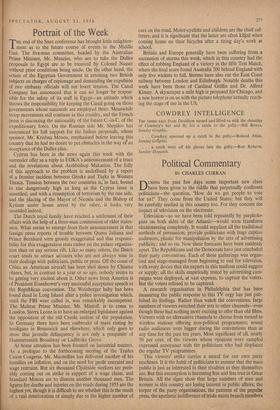Portrait of the Week
rr HE end of the Suez conference has brought little enlighten- 1 ment as to the future course of events in the Middle East. The five-man committee, headed by the Australian Prime Minister, Mr. Menzies, who are to take the Dulles Proposals to Egypt are to be received by Colonel Nasser without prior conditions being made. On the other hand, the action of the Egyptian Government in arresting two British subjects on charges of espionage and demanding the expulsion of two embassy officials will not lower tension. The Canal Company has announced that it can no longer 'be respon- sible for the safety of its staff in Egypt—an attitude which throws the responsibility for keeping the Canal going on those governments whose nationals are employed there. Meanwhile troop movements still continue in this country, and the French press is discussing the nationality of the future C.-in-C. of the expeditionary force. On the Russian side Mr. Shepilov has announced his full support for the Indian proposals, whose sponsor, Mr: Krishna Menon, emphasised before leaving this country that he had no desire to put obstacles in the way ot an acceptance of the Dulles plan.
Cyprus has been in the news again this week with the surrender offer as a reply to EOKA's announcement of a truce and the revelations about Archbishop Makarios. The folly of this approach to the problem is underlined by a report of a frontier incident between Greeks and Turks in Western Thrace. Tension between the two countries is„' in fact, bound to rise dangerously high as long as the Cyprus issue is unsettled; and with a resumption of terrorism by the one side, and the placing of the Mayor of Nicosia and the Bishop Of Kytium under house arrest by the other, it looks very unsettled indeed. cars on the road. Motor-cyclists and children are the chief suf- ferers, and it is significant that the latter are often kilted when coming home on their bicycles after a tiring day's work at school.
Britain and Europe generally have been suffering from a succession of storms this week, which in this country had the effect of robbing England of a victory in the fifth Test Match, where the final score found Australia 200 behind England with only five wickets to fall. Storms have also cut the East Coast railway between London and Edinburgh. Notable deaths this week have been those of Cardinal Griffin and Dr. Alfred Kinsey. A skyscraper a mile high is proposed for Chicago, and a new horror is on us with the picture telephone actually reach- ing the stage of use in the US.


































 Previous page
Previous page